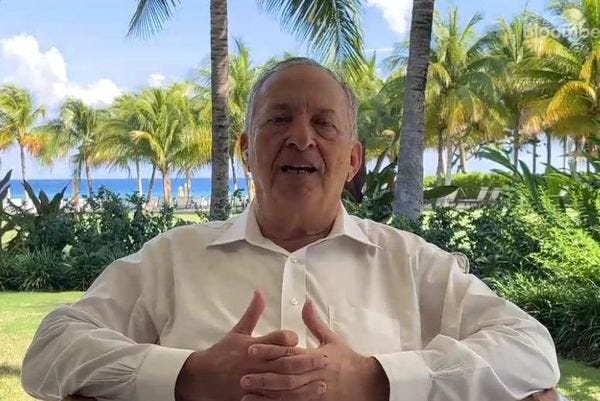Larry Summers Not Afraid Of You Losing Your Job If That's What It Takes To Whip Inflation Now
Why are you so selfish when tickets to paradise are getting so expensive?
Former Treasury Secretary Larry Summers, who was very miffed that Joe Biden kept tens of millions of Americans from falling into poverty or homelessness during the pandemic, is finally pleased about something, which should already warn you to hold your children closer and prepare a "go bag" in case of eviction.
What he's pleased about isn't simply the fact that he's apparently enjoying his January in a nice warm place with palm trees, where he can be interviewed by Bloomberg TV's "Wall Street Week" in his shirtsleeves, although that level of comfort probably didn't hurt. Beyond that, Summers, in the dead of winter, said from some unnamed tropical beach that he's happy to see the Federal Reserve has finally "come around" to the commonsense perspective that "there’s going to need to be increases in unemployment to contain inflation."
Specifically, Summers, a paid Bloomberg contributor, was glad that December's job report showed slowing gains in new jobs, meaning that thank heavens our long national nightmare of record low unemployment may finally be near an end, thanks to the Fed cranking up interest rates in hopes of curbing inflation. Here's the interview:
The jobs numbers, Summers said, "showed a strong economy with slowing inflationary pressure," and that may bode well for inflation, eventually. "My view continues to be that you don't get inflation down to the two-percent range without getting wage inflation substantially down, and you don't get wage inflation substantially down without meaningful slack in the labor market," Summers said, which is economist-speak for we need wages to drop and we need higher unemployment, because workers have it too good and that's bad.
Summers did say the strong jobs numbers likely mean we won't have a recession anytime soon, but then cautioned that hoping for a "soft landing" — in which inflation declines without the economy going into a recession, with resulting high unemployment — might be a very silly thing to hope for because that's an illusion anyway. We're still headed for the crash that we need, hooray:
I think the judgment that soft landings are the triumph of hope over experience continues to be the right best guess. [...] I’m not sure that continued strength points to a softer landing, rather than pointing to even a harder landing when things re-equilibrate.
As Rebecca keeps yelling while pulling her hair own hair out, it does seem odd that if "because the economy" requires people to be unemployed that people would then also insist on cutting unemployment benefits because "lazy" and "takers." But that is why they call it the dismal science.
Vice helpfully translates the economic assumptions at work here, before poking at them with a sharp stick.
The thinking goes that when interest rates increase, it gets more expensive to borrow money, and companies, expecting their earnings to decrease as a result, start laying off employees. Those employees have less spending power as a result. With both corporations and consumers spending less, competition for goods decreases. And with more unemployment, corporations can pay their employees less, reducing labor costs and allowing them to, in theory, lower the cost of goods.
The Fed wants to prevent what economists call a “wage price spiral,” where a scarcity of unemployed workers leads workers to demand higher wages and leading corporations to raise prices on consumers.
The problem with this very popular understanding of the link between unemployment and inflation is that it makes laborers the ones who need to suffer, because how dare they want compensation for their part in creating profits? Clearly, profits belong to CEOs and shareholders, so it's only right for the Fed to make capital scarcer by raising interest rates so companies can lay off workers and cool inflation.
Vice points out that in the current inflationary trend, "executive profits seem to be the main culprit: by some measures, up to 54 percent of recent price increases could be attributed to higher profit margins and only 8 percent to rising labor costs." Not that the Fed or Congress have any stomach for taxing higher profits or even imposing price controls, because those would interfere with the free market, while forcing layoffs through higher interest rates is okay. It's not like low-wage workers are gonna give their SuperPAC funds to another candidate, haw-haw.
Vice also points that it's pretty questionable to assume that increasing unemployment will push consumer prices down by reducing consumer demand, given that the prices that have been increasing are
for basic staples of daily living: eggs, gas and electric bills, and rent. The people most likely to be laid off and remain unemployed are lower-wage earners, and the idea that we can get grocery prices under control by making poor people not want groceries does not seem to have any relationship to reality.
But then, those people aren't economists from Harvard, so why would you expect them to understand why losing their jobs is necessary in order bring down inflation? Besides, if a lot of them are unemployed, it should be easy enough to convince them that desperate asylum seekers took their jobs, and then Republicans can cut taxes for the rich again, the end.
[ Vice / Bloomberg TV on YouTube]
Yr Wonkette is funded entirely by reader donations. If you can, please give $5 or $10 a month so we can keep you up to date on all the wonders of capitalism, the best system in the world even for those crushed by it.
Do your Amazon shopping through this link, because reasons .




The man who proves that opportunities may run in families, but ability does not.
You'd think the real estate lobby would be all over this.